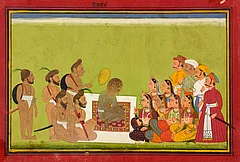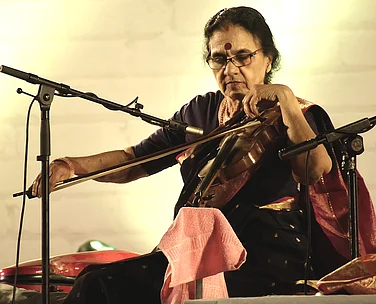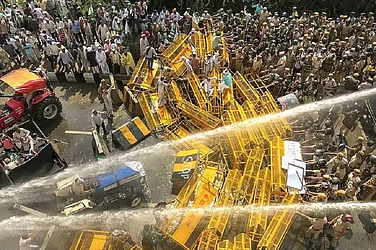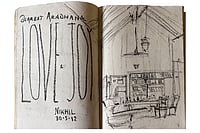It begins in this room, which is essentially a corridor, fitted with a television screen on which you are to witness the life and times of Radhe Maa (Sukhvinder Kaur), a self-styled godwoman from Punjab. Red outfit, red teeka and blazing red lipstick. Her trademarks. Also, a trishul that she holds in her hands.
The suspense, the competition and the storytelling are all part of the darshan experience, which she has agreed to give Outlook on a rainy night in Mumbai. Only one of us would be blessed tonight, a man says.
For the uninitiated, the waiting ritual is like witnessing a distortion of time. It is past 10 pm at her bungalow, Radhe Maa Palace, in Borivali. It is on Google Maps. Life-size statues of Greco Roman sentries of the underworld guard the premises. On the fourth floor, you spot the red bulbs. On the ground floor, two women chant in front of a statue, which is seemingly of goddess Durga, but the hairstyle is contemporary. The wavy, blow-dried kind, with bangs.
“You are going to meet a glamorous, beautiful godwoman,” Prof Ronki Ram said over the phone as he discussed the social capital generation at the deras and ashrams. “They are intelligent and smart.”
Talli Baba, a man dressed in saffron robes, Radhe Maa’s aide, tells his story of his encounter with the godwoman. He was only five-years-old and had lost his mother seven months earlier, when he saw Radhe Maa at a satsang in Phagwara, Punjab.
“I saw my mother’s face when I saw her,” he says. “She hasn’t changed. She looks the same.”
Talli Baba’s real name is Gaurav Kumar Sharma. Talli, in Punjabi, means bells, he says.
The dozen-odd people in the room recount their stories of miracles they attribute to Radhe Maa.
A man from Panipat is here with his family.
“She saved my father’s life thrice,” he says.
They had needed a blood donor and someone showed up at the hospital each time. His father survived.
There is no room for chance here.
In the ambiguous realm of godmen and godwomen, devotees credit them without evidence, dismissing science and rationality.
The trust that Radhe Maa runs is recounted for its charity work, including gifting wedding presents to sponsored brides. Talli Baba says the choice offered is between a vacuum cleaner and a blood pressure machine.
God works in mysterious ways.
To be in this room, where men and women and girls and boys are all wearing headbands that have Jai Radhe Maa written in gold, you have to attempt a total suspension of disbelief. We are here to witness the darshan and understand why people believe in her despite allegations, including a 2014 dowry harassment case and 2015 voyeurism and sexual abuse charges by former devotees.
We have been told Radhe Maa can read your mind, listen to everything you say, etc.
My eyes scan the room for any hidden microphones and CCTV cameras. Out of habit.
Jassi, a Sikh from Ludhiana, tells us his story. As a young boy, he met Radhe Maa at a neighbour’s house. His family was struggling financially, with a sister’s wedding approaching. After meeting Radhe Maa, things improved. He later moved to Mumbai, met Radhe Maa again and got a job without formal degrees. Now, his family manages the langar at Radhe Maa’s events.
At some point, we are told Radhe Maa would see the Outlook team. We are to wear the headbands and do what others will do.
“Touch her feet,” he says.
We are ushered into what they refer to as her gufa (den) where she lives with Choti Maa, her aide.
Everything is red. Walls, floors, chairs. The doors are golden and as is her bed and everything else that’s in the room. The bedspread is made of red velvet, like her gown. She is sitting on a stool placed on the bed.
There’s music. The women clap, the men chant.
She calls out to a man who has come from Ludhiana. He receives a thread that she ties around his wrist. People in the room cheer.
Our photographer, Dinesh Parab, is also summoned. She places her hands on his, and gives him a coin. Shweta Desai of Outlook is next. She gets a yellow dupatta.
A woman stands up and begins to dance. Radhe Maa then calls me.
I am given a red dupatta.
Later, when we interview her, she sits on a golden throne.
“You are emotional,” she tells me. “I can see it.”
In that moment, I want to believe her. Hope, love and loss are what lead us to spaces where we want to be understood and where we hope for miracles.
It is a place for the broken-hearted.
Radhe Maa avoids discussing controversies. Journalists depict her as a make-up wearing woman, with a viral photo of her in a miniskirt labelled obscene.
The world of godwomen and godmen is tough, competitive, where one must stand out. If godmen can tie loincloths, why can’t a Radhe Maa wear a miniskirt?
She is smart.
“You are here to test me,” she says.
Then, she places her hand on my head. I am the chosen one.
I am told to watch Maha Shiv Puran on a streaming platform.
“She has given you peace,” Choti Maa tells me.
The range of problems faced by people here has a similar trope. Troubles with romance, troubles at work, trouble with change.
Intelligence and education do not protect against superstition because uncertainty is difficult. We want answers, miracles. We are the ideal customers for the miracle market.
We want to believe that a placebo effect is a miraculous cure. After over a hundred devotees died at Bhole Baba’s satsang in Hathras recently, we explored why people believe in godmen and godwomen, examining their branding and attending satsangs to witness without judgement. On the way back, I held the dupatta, unsure about what to do with it.
Radhe Maa had said I will return.
Although, I did want to believe in miracles that night.
(This appeared in the print as 'Between Reason And Rhapsody')































